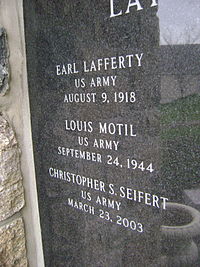- Hasan Akbar case
-
Hasan Akbar Born April 21, 1971
Watts, Los Angeles, CaliforniaAllegiance  United States of America
United States of AmericaService/branch United States Army Years of service 1998–2004 Rank Former sergeant, reduced in rank to private after sentencing Unit 326th Engineer Battalion, 101st Airborne Division The Hasan Akbar case refers to an event in the 2003 U.S. invasion of Iraq, when Hasan Karim Akbar (born Mark Fidel Kools on April 21, 1971, in Watts, Los Angeles, California)[1] was convicted of the double-murder of two officers assigned to Headquarters and Headquarters Company, 1st Brigade Combat Team, 101st Airborne Division at Camp Pennsylvania, Kuwait.[2]
The victims were Army Captain Christopher Seifert and Air Force Major Gregory Stone. Fourteen other soldiers were also wounded in the incident, which took place on 23 March 2003. The sentence of death, affirmed by the commander of the 18th Airborne Corps,[3] is due to be heard on the court's docket when scheduled by the Army Court of Criminal Appeals under an automatic appeal.[dated info] As of 2010 Hasan Akbar is confined in the United States Disciplinary Barracks.
Contents
Persons involved
Mark Fidel Kools was renamed Hasan Karim Akbar after his mother remarried and converted to Islam, changing her child's name to a Muslim one as well.[1]
He was admitted in 1988 under the name of Mark Fidel Kools to the University of California, Davis, graduating nine years later with Bachelor's degrees in both Aeronautical and Mechanical Engineering.[4] After joining the United States Army, he was assigned to Company A, 326th Engineer Battalion of the 101st Airborne, assigned as a sapper and eventually deployed to Kuwait.
Army Captain Christopher Seifert was also a member of the 101st Airborne Division. Air Force Major Gregory Stone, a member of the 124th Air Support Operations Squadron, Idaho Air National Guard, was attached to the 101st Airborne Division.
Killings and aftermath
The inscription of Christopher Seifert was placed on the Williams Township Veterans Memorial in Williams Township, Northampton County, Pennsylvania.
Akbar was charged in a hand grenade and shooting attack that killed two, while wounding fourteen other soldiers on 23 March 2003. The attack took place at Camp Pennsylvania, Kuwait, a rear base camp for the invasion. There, Akbar threw four hand grenades into three tents during early morning when the majority of troops were sleeping, and fired his rifle during the ensuing chaos. News reports at the time claimed that Akbar had been recently reprimanded for insubordination and was told he would not join his unit's push into Iraq.
Although Akbar confessed to the crimes, his lawyers claimed that he had a history of mental illness which was known to the military.[5] During his trial Akbar smuggled a pair of scissors out of a conference room, then asked the Military Police officer guarding him to remove his hand cuffs so he might use the restroom. When the MP did remove Akbar's restraints, he then stabbed the MP in the shoulder and neck with the scissors before being wrestled to the ground by another MP. The army judge did not allow this attack to be admitted as evidence prior to sentencing.[6][7][8]
He was tried in Fort Bragg, North Carolina in front of a military jury of nine officers, with ranks from major to colonel, and six senior sergeants. There were 13 men and two women on the jury.
Verdict and appeals
- On 21 April 2005 Akbar was found guilty of two counts of premeditated murder (of Captain Seifert, who was shot in the back, and Major Stone, struck by shrapnel) and three counts of attempted premeditated murder.[9] He was sentenced to death on 28 April, the jury deliberating for approximately 7 hours.[10] As of 2010 Hasan Akbar is confined in the United States Disciplinary Barracks.[11]
- On 20 November 2006 Lieutenant General John Vines, commander of the 18th Airborne Corps, affirmed the death sentence against Akbar.[3] The case went to the Army Court of Criminal Appeals under an automatic appeal. If the appeal fails, the execution will take place by lethal injection.[12]
Since the Vietnam War, Akbar is the first U.S. soldier to be charged with the murder of another soldier during wartime, and the third soldier since the Vietnam War to be sentenced to death for killing a fellow soldier.
Possible motives
Military officials attributed Akbar's motive to resentment.[13] In a diary entry dated 4 February 2003, Akbar referred to mistreatment by his fellow soldiers:
- "I suppose they want to punk me or just humiliate me. Perhaps they feel that I will not do anything about that. They are right about that. I am not going to do anything about it as long as I stay here. But as soon as I am in Iraq, I am going to try and kill as many of them as possible."
Akbar wrote prior to the attack "I may not have killed any Muslims, but being in the army is the same thing. I may have to make a choice very soon on who to kill."[14]
Prosecutors alleged that his diary entries and his actions (stealing hand grenades and turning off the generator that lit the camp) showed that the attack was premeditated.
Akbar himself reportedly said, just moments after his arrest, "You guys are coming into our countries, and you're going to rape our women and kill our children."[15][16]
See also
- Naser Jason Abdo
- 2005 Deaths of Phillip Esposito and Louis Allen
- 2007 Fort Dix attack plot
- 2009 Camp Liberty attack
- 2009 Fort Hood attack
- 2009 Lloyd R. Woodson case
- Nidal Malik Hasan
- Anwar_al-Awlaki
- Adam Yahiye Gadahn
References
- ^ a b Roig-Franzia, M. (22 April 2005). Army Soldier Is Convicted In Attack on Fellow Troops. Washington Post. Retrieved 28 July 2008
- ^ Military Times, 2003. [1] "Honor the Fallen". Retrieved 02-22-2010.
- ^ a b http://www.breitbart.com/news/2006/11/20/061120193615.8twiyvaz.html Death sentence affirmed for soldier who killed comrades in Kuwait
- ^ UC Davis News & Information :: Iraq war hits closer to home with arrest of UC Davis alum
- ^ "Profile: US soldier Hasan Akbar". BBC News. April 29, 2005. http://news.bbc.co.uk/1/hi/world/americas/4496989.stm. Retrieved September 10, 2008.
- ^ Our Apologies
- ^ Sgt. Hassan Akbar Sentenced to Death for Kuwait Attack
- ^ Michelle Malkin » Confirmed: Hasan Akbar Stabbed An Mp
- ^ http://www.foxnews.com/story/0,2933,154220,00.html Akbar Convicted of Murder
- ^ Soldier gets death for killing officers – Crime & courts – MSNBC.com
- ^ Goldman, Russell. "Fort Hood Shooter Could Join 5 Others on Death Row." ABC News. November 13, 2009. 1. Retrieved on October 21, 2010.
- ^ [2]. Retrieved October 23, 2011.
- ^ http://www.foxnews.com/story/0,2933,81898,00.html Army: U.S. Soldier Acted Out of Resentment in Grenade Attack
- ^ Hasan Akbar's Chilling Diary Entries [Weblog] – Daniel Pipes
- ^ Goff, S. (2005). "What We Don't and Do Know: The Case of Hasan Akbar" Counterpunch.org. Retrieved November 25, 2006.
- ^ War Crimes and Crimes against Humanity
External links
Categories:- 1971 births
- Living people
- Murder in Kuwait
- Murder in 2003
- People from Los Angeles, California
- American people convicted of murder
- United States Army soldiers
- University of California, Davis alumni
- Friendly fire incidents
- Prisoners sentenced to death by the United States military
- People convicted of murder by the United States military
- United States military law
- African American Muslims
- Converts to Islam
- United States Army in the Iraq War
Wikimedia Foundation. 2010.


